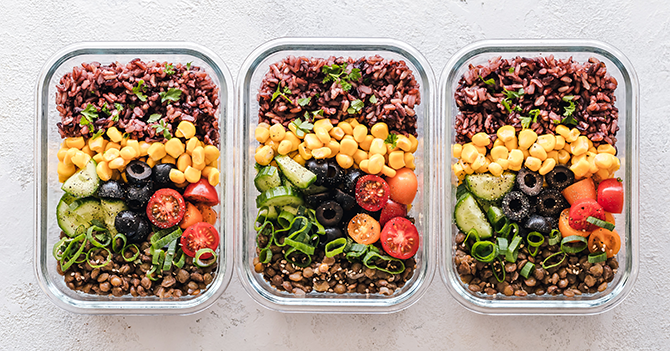A Beginner’s Guide to Cooking With Plant Based Chicken at Home
A Beginner’s Guide to Cooking With Plant Based Chicken at Home
Blog Article
Everything About Healthy And Balanced Food: Benefits of Checking Out Plant Based Alternatives
The discussion bordering plant-based diet plans has actually gained substantial attention over the last few years. Several individuals are exploring the potential health advantages, nutritional benefits, and environmental effects connected with these dietary choices. As people end up being much more aware of their food's impact on wellness and sustainability, questions arise regarding the practicalities of embracing such a way of living. What particular changes can one expect, and exactly how might these options reshape not only personal wellness however additionally the earth's future?
Comprehending Plant-Based Diet Regimens
Although many individuals associate plant-based diet plans mainly with vegetarianism or veganism, these diet plans can include a wide variety of eating patterns that prioritize entire, minimally refined plant foods. Such diets frequently consist of fruits, vegetables, whole grains, seeds, vegetables, and nuts, while removing or restricting animal products. This flexibility allows individuals to customize their nutritional selections according to individual choices and nutritional needs. Some might adopt a primarily plant-based diet while still periodically consuming meat or milk, usually referred to as a flexitarian technique. The emphasis stays on including more plant foods, which can result in a varied variety of tastes and dishes. Understanding these numerous analyses of plant-based eating is crucial for valuing its access and appeal in modern food society.
Health Conveniences of Plant-Based Foods
The wellness advantages of plant-based foods are significant, using a nutrient thickness benefit that supports total well-being. Research study suggests that these foods can improve heart health and wellness and play a necessary duty in efficient weight monitoring. By integrating a lot more plant-based options, individuals might enhance their dietary selections and advertise long-lasting health.
Nutrient Thickness Benefit
Nutrient density plays an important role in the health benefits of plant-based foods, making them a compelling selection for those seeking a well balanced diet. Plant-based foods, such as fruits, veggies, vegetables, nuts, and entire grains, are commonly abundant in necessary vitamins, minerals, and anti-oxidants while being lower in calories. This high nutrient density permits people to eat less calories while still satisfying their nutritional needs. In addition, these foods are loaded with nutritional fiber, advertising gastrointestinal health and wellness and assisting in weight management. By including nutrient-dense plant-based alternatives, customers can enhance their overall wellness, sustain their body immune systems, and minimize the risk of chronic diseases. Inevitably, the nutrient density of plant-based foods emphasizes their importance in a health-conscious way of life.
Heart Health And Wellness Improvement

Weight Management Assistance
In addition to promoting heart health and wellness, a plant-based diet regimen can significantly help in weight management. This nutritional approach highlights whole foods such as fruits, vegetables, vegetables, nuts, and entire grains, which are normally reduced in calories and greater in fiber compared to animal-based products. The high fiber content aids raise satiation, decreasing overall calorie consumption. Plant-based diet plans are typically abundant in vital nutrients while reduced in undesirable fats, making it simpler to maintain a healthy and balanced weight. Research indicates that individuals who embrace a plant-based way of living have a tendency to have reduced body mass indexes (BMIs) and experience more successful weight management contrasted to those who consume meat-heavy diets. Subsequently, embracing plant-based choices is a calculated choice for efficient weight administration
Nutritional Value of Plant-Based Components
Plant-based active ingredients are abundant in important nutrients, offering a diverse selection of vitamins, minerals, and antioxidants that contribute to total health and wellness. A comparison of protein resources exposes that while pet products are frequently deemed premium, lots of plant-based choices offer ample protein and other beneficial substances. Understanding the dietary value of these ingredients can aid individuals make informed nutritional choices.
Essential Nutrients in Plants
Nutrient-rich ingredients discovered in plants use a diverse range of crucial vitamins and minerals that add significantly to general health. These active ingredients are rich in vitamins A, C, and K, which sustain immune function, vision, and blood clotting, respectively. Additionally, plants offer vital minerals such as calcium, potassium, and magnesium, critical for heart health and wellness, muscle mass feature, and bone toughness. The existence of fiber in plant-based foods help food digestion and advertises a healthy and balanced intestine microbiome. Anti-oxidants, discovered generously in vegetables and fruits, aid battle oxidative tension and lower inflammation. Furthermore, several plant foods are low in calories yet high in nutrients, making them a superb selection for those seeking to maintain a healthy and balanced weight while making sure excellent nutrient consumption.
Contrasting Protein Sources
Protein resources differ considerably in their dietary accounts, with plant-based active ingredients supplying distinct benefits. Unlike animal healthy proteins, which typically have hydrogenated fats and cholesterol, plant proteins often tend to be lower in these harmful parts. Legumes, nuts, seeds, and whole grains are rich in important visit our website amino acids, fiber, vitamins, and minerals. For example, lentils give high healthy protein web content along with considerable iron and folate, while quinoa is a full protein, offering all nine necessary amino acids. Additionally, plant-based healthy proteins are often accompanied by antioxidants and phytochemicals that sustain total health. The change to plant-based healthy protein sources not only boosts dietary consumption however also lines up with sustainable dietary methods, lowering ecological effect and promoting lasting health and wellness benefits.
Ecological Effect of Plant-Based Eating
As understanding of climate modification grows, many people are discovering lasting nutritional options that can significantly lessen their environmental impact. Plant-based eating has actually become a considerable contributor to lowering greenhouse gas discharges, which are mostly linked with animals manufacturing. The growing of fruits, legumes, veggies, and grains generally requires fewer resources, such as water and land, contrasted to pet farming. In addition, plant-based diet regimens can cause lowered deforestation, as much less land is required for grazing animals or expanding animal feed. By moving towards plant-based alternatives, customers can sustain biodiversity and advertise much healthier communities. Generally, accepting plant-based eating not only advantages individual health and wellness however also represents a vital step towards ecological sustainability and preservation efforts.
Conquering Common Misconceptions
While several people recognize the benefits of a plant-based diet plan, a number of mistaken beliefs typically hinder them from fully embracing this way of living. An usual belief is that plant-based diets do not have adequate healthy protein; nonetheless, numerous plant sources, such as legumes, nuts, and tofu, provide adequate healthy protein. In addition, some important source presume that this diet is expensive, when actually, staples like beans, rice, and seasonal vegetables can be fairly inexpensive. One more misunderstanding is that plant-based consuming is extremely limiting, whereas it in fact provides a diverse array of foods and flavors. Ultimately, several worry that a plant-based diet regimen may cause deficiencies, yet with appropriate preparation, individuals can acquire all needed nutrients, consisting of vitamins and minerals, while appreciating a variety of scrumptious meals.
Tips for Transitioning to a Plant-Based Way of life
Making the change to a plant-based way of life can be an enriching experience, though it often requires some support to browse the initial changes. Initially, individuals are encouraged to begin gradually, including more fruits, vegetables, legumes, and entire grains right into their meals while decreasing meat and dairy products consumption. Meal preparation is essential; preparing a regular menu can help ease the adjustment and prevent final unhealthy choices. Exploring brand-new recipes and cooking methods can also keep and enhance the experience excitement regarding plant-based consuming. Additionally, joining support system or neighborhoods can supply motivation and share beneficial tips. Remaining informed about nutrition guarantees well balanced meals, avoiding deficiencies while promoting a healthy, enjoyable plant-based way of living.

Delicious Plant-Based Dish Concepts
Checking out delicious plant-based dish ideas can motivate people to welcome a more nourishing diet. One popular alternative is a hearty quinoa salad, featuring cherry tomatoes, cucumber, and a zesty lemon-tahini dressing. One more favorite is a mouthwatering lentil stew, packed with carrots, celery, and news fragrant herbs, perfect for a soothing supper. For breakfast, overnight oats made with almond milk, chia seeds, and covered with fresh berries offer a nourishing begin to the day. Additionally, a vibrant veggie stir-fry with tofu and a range of vivid veggies can be a fast yet satisfying meal. Velvety avocado salute on whole-grain bread, sprayed with flavors and seeds, offers a straightforward yet tasty snack. These dishes showcase the variety and splendor of plant-based eating.

Often Asked Inquiries
Can a Plant-Based Diet Plan Supply Enough Protein?
The question of whether a plant-based diet can provide sufficient protein is usual. Numerous resources, consisting of legumes, nuts, seeds, and entire grains, can fulfill protein needs efficiently, supporting a nourishing and balanced diet for people.
Are Plant-Based Diets Suitable for Kid?
The viability of plant-based diet plans for kids depends on mindful planning. Appropriate nutrients have to be guaranteed, consisting of proteins, vitamins, and minerals. With correct assistance, such diet regimens can support healthy growth and development in children.
Exactly how Do I Eat in restaurants on a Plant-Based Diet plan?
Eating in restaurants on a plant-based diet plan includes seeking dining establishments with diverse menus, requesting adjustments, and exploring vegan-friendly choices. Planning in advance and interacting nutritional preferences can enhance the dining experience while maintaining dietary choices.
What Prevail Allergens in Plant-Based Foods?
Typical allergens in plant-based foods include soy, gluten, nuts, and seeds - Gluten Free BBQ Sauce. People complying with a plant-based diet must understand these irritants and read labels carefully to avoid damaging reactions and ensure safe usage
Can Plant-Based Diets Help With Fat Burning?
Research study indicates that taking on a plant-based diet plan may assist in weight loss as a result of its commonly reduced calorie thickness and higher fiber content. This combination can improve satiation, assisting people manage their calorie intake successfully. Lots of individuals connect plant-based diets mainly with vegetarianism or veganism, these diets can incorporate a wide variety of eating patterns that prioritize whole, minimally processed plant foods. Nutrient thickness plays a necessary function in the health benefits of plant-based foods, making them an engaging choice for those looking for a balanced diet. Plant-based diet plans have been revealed to considerably improve heart health and wellness, as they typically include aspects that support cardio function. In enhancement to promoting heart health and wellness, a plant-based diet plan can significantly aid in weight monitoring. A common belief is that plant-based diet plans do not have adequate healthy protein; however, many plant sources, such as legumes, nuts, and tofu, provide sufficient protein.
Report this page